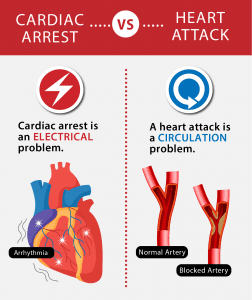All heart conditions aren’t alike. Two that often get confused are heart attack and sudden cardiac arrest (SCA).
To learn more about the signs, symptoms and causes of each, we sat down with two of our heart experts, J. Doyle Walton, MD, with Grand View Health Cardiology Alderfer and Travis, and Daniel Tsyvine, MD, with Grand View Health Cardiology Buxmont.
What is a heart attack?
A heart attack is caused by a blocked coronary artery. “Often, plaque builds up inside one or more arteries and restricts blood flow to your heart,” says Dr. Walton, a triple board-certified, fellowship-trained interventional cardiologist. When blood flow is blocked for too long, it can cause part of the heart muscle to die.
Heart attacks are quite common, affecting more than 800,000 people each year, according to the Centers for Disease Control and Prevention.
What is sudden cardiac arrest (SCA)?
SCA is a sudden, unexpected loss of heart function. “SCA is caused by an electrical disturbance that disrupts the heart’s normal rhythm,” explains Dr. Tsyvine, a double-board certified, fellowship-trained interventional cardiologist. Because the heart stops suddenly, it also stops blood flow to vital organs such as the lungs and brain.
While SCA is less common than heart attacks, happening about half as often (356,000 times each year), they carry a fatality rate of nearly 90%, according to the SCA Foundation.
What are the symptoms of heart attack and SCA?
Heart attack (men): Chest pain—which may spread to the jaw or neck—is the most common sign of a heart attack in men.
Heart attack (women): While chest pain is also the most common sign for women, females also experience other, more subtle symptoms. These include shortness of breath, nausea, vomiting, and back or jaw pain. “About 1 in 5 heart attacks are silent, meaning people don’t know they even had one,” says Dr. Tsyvine.
SCA: Near immediate loss of consciousness, no pulse, and no breathing or very abnormal breathing. “SCA is a medical emergency that demands immediate intervention,” Dr. Walton says.
Is there any relationship between the two conditions?
A heart attack can sometimes trigger SCA, which is one of the many reasons why it’s important to know the difference between the two conditions.
What to do if someone you know suffers a heart attack or SCA?
Heart attack: Call 911 immediately. Give the person four aspirin tablets (81 mg) if available. “If the person loses consciousness, start CPR immediately,” says Dr. Tsyvine. Use an automated external defibrillator (AED) if one is nearby.
SCA: Call 911 immediately. Begin CPR. The American Heart Association recommends hands-only CPR, a technique where you deliver hard and fast chest compressions. Continue CPR until EMS arrives. Learn more about hands-only CPR in these videos.
Where can I get medical care for serious heart problems?
With heart attack and SCA, time is of the essence. The David M. Flowers Cardiac Catheterization Laboratory at Grand View Health provides 24/7 care for both emergency and scheduled cardiac procedures.
Interventional cardiologists like Drs. Tsyvine and Walton can perform lifesaving procedures such as percutaneous coronary intervention (PCI), which opens blocked blood vessels and restores blood flow following a heart attack.
For people in Bucks and Montgomery counties, the Cath Lab provides a high standard of care accredited by Corazon, Inc., a leader in national services for the cardiovascular specialty.
Learn more about the David M. Flowers Cardiac Catheterization Lab at Grand View Health.

